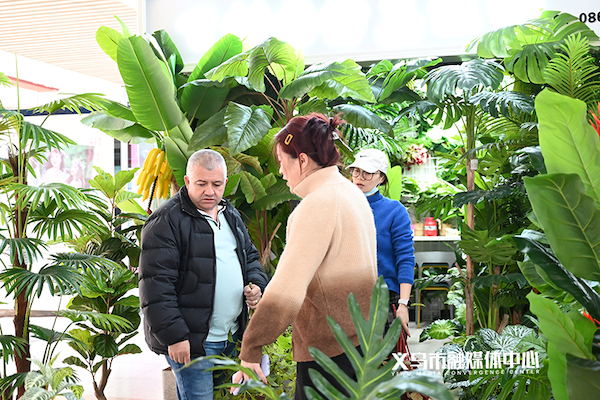Nation eases path for multinationals
The law also provides foreign capital with easier market access and reduces restrictions for investors. Last year, nearly 9,000 joint ventures were set up between foreign investors and Chinese nationals.
United States industrial conglomerate Honeywell is one such beneficiary.
The company found that it was a perfect fit for the Chinese government's parallel agendas to welcome foreign investment in advanced manufacturing, while attracting advanced industries to central and western areas of the country.
Steven Lien, president of Honeywell China, said, "To ride the smart manufacturing trend, we entered into strategic cooperation last year with Shang Gong Group Co (SGSB Group), a leader in China's sewing machine industry.
"Honeywell's technologies in the internet of things and automation solutions can empower SGSB Group to achieve smart manufacturing and smart logistics warehousing management."
Another eye-catching investment by Honeywell was the establishment of a wholly-owned subsidiary, Huosheng Industrial Technology Co, in Wuhan, capital of Hubei province, where the pandemic hit China hard at the start of last year.
Lien said the launch was possible due to the close cooperation and support received from the Wuhan government.
"With this investment, Honeywell continues to promote technological innovation to meet the demands of the mass-and mid-markets in China's central and western areas," he said.
Standard Chartered Bank China also invested in Wuhan, where it opened a sub-branch after the 76-day lockdown was lifted last year.
In addition, the bank is looking at opportunities arising from the Guangdong-Hong Kong-Macao Greater Bay Area, internationalization of the renminbi, green finance and the Belt and the Road Initiative, among others.
Jerry Zhang, executive vice-chairman and CEO of Standard Chartered Bank China, which invested $40 million last year in setting up a Greater Bay Area center in Guangzhou, capital of Guangdong province, said, "We will make continuous investment in China to deliver on opportunities presented by the country's opening-up."
She referred to a measure that allows international institutions to take part in interest rate derivatives trading on the China Interbank Bond Market, or CIBM, after they sign the International Swaps and Derivatives Association master agreement.
"From a legal perspective, this measure effectively cleared the hurdle for international institutions to make derivatives deals on the CIBM," Zhang said.
Standard Chartered China has helped two international investors complete interest rate swap deals on the CIBM, "making our bank one of the most active settlement agency banks for the CIBM in this part of the world", she added.
Additional efforts
Global consultancy Accenture has helped Chinese companies with digital technologies and accelerated their transformation.
Zhu Wei, chairman of Accenture China, said this momentum has brought vitality to the Chinese economy at a time when additional efforts are being made to stabilize foreign investment.
"China is home to many excellent enterprises, as well as being the most important market for many of our clients," Zhu said.
He added that the company, which specializes in consulting and providing solutions for the digital transformation of enterprises, is joining hands with Chinese counterparts to practice such transformations and make use of innovation.
"For instance, we are focusing on building innovation ability in China. We have set up our global research and development innovation hub in Shenzhen, Guangdong, and digital hub in Shanghai to co-create and deliver tangible value for our clients and shared success for our stakeholders," Zhu said.
Delivering the latest Government Work Report, Premier Li said China would strive to make the Regional Comprehensive Economic Partnership take effect as soon as possible, enable the signing of its investment deal with the European Union, and accelerate free trade negotiations with Japan and South Korea.
Multinational corporations are not only thriving in China, but are using their best practices to empower local partners.
Last year, L'Oreal launched its Big Bang Beauty Tech Challenge contest, with the aim of working with technology startups in China, boosting the beauty industry and bringing the world more innovative solutions from China.
Megarbane, the L'Oreal China CEO, said core technologies from the 10 winning projects, including a livestreaming ecosystem, smart supply chain and biosynthesis, are expected to be used in the group's day-to-day operations.
This year's competition would also include "certain expertise from France", he added.
Cytiva, the life science company, has partnered with Ireland's National Institute for Bioprocessing Research and Training and Guangzhou Technology Co to open a training center for biological manufacturing.
Yu, the company's general manager in China, said the center would transform Cytiva's experience and expertise into biotechnology research and development, which along with its manufacturing and management know-how would drive professional training for local talent.
Meanwhile, Honeywell is taking "created in China" products and solutions overseas.
The company is providing advanced technologies for China's largest investment project in Brunei-the Hengyi Industries integrated petrochemical complex on Pulau Muara Besar, a 95-hectare island in Brunei Bay.
Lien, the Honeywell China president, said the complex would be able to produce more than 3.8 million tons of paraxylene a year-the primary component of many plastic resins, films and fibers.
"Honeywell's innovation efforts in China and our global presence enable us to work closely with Chinese partners to deliver highly innovative projects worldwide, which aligns with China's 'dual circulation' development model," he said.
For this development model, the domestic market is the mainstay, with the domestic and international markets reinforcing each other.
Zhou Lanxu in Beijing contributed to this story.

 Yiwu and Qingtian: Global supermarket alliance spurs economic growth
Yiwu and Qingtian: Global supermarket alliance spurs economic growth Artificial flowers: Yiwu's evergreen business
Artificial flowers: Yiwu's evergreen business Yiwu Intl Trade Market reopens after Spring Festival holiday
Yiwu Intl Trade Market reopens after Spring Festival holiday